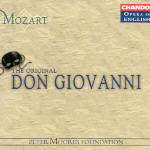Thanks to Chandos’ amazing ability to record the English language (the label really ought to patent it), 80 percent of Amanda Holden’s fine translation of Mozart’s masterpiece is understandable–quite a feat. It’s a comfortable, not-too-operatic translation, for instance:
Leporello: Who’s dead, you or grandpa?
Don Giovanni: What a damn stupid question! Old grandpa.
And it’s not up-to-date in any offensive manner, although somehow characters referring to one another as “bastards” in opera does make you perk up in a disquieting way. More frequently, the words suit the characters well, with the peasants speaking in a very down-to-earth fashion and the nobility just a hair more hoity-toity. If there’s a problem in all of this, Chandos’ first foray into Mozart in its Opera-in-English series, it’s the cast’s almost intolerable upper-crust pronunciation. I’m not asking for any other class or nationality to take over, but rolling the letter “r” is always abnormal–and always present on this set. Is it possible to be accent-free? I doubt it–but Masetto too often sounds as if he might be announcing for Masterpiece Theater and the sheer British-ness of it all can wear thin after a while.
The version we get here is the “original”–that is, the Prague version, without either Ottavio’s first-act or Elvira’s second-act arias. And Mozart, as ever, was right insofar as drama is concerned; without them there’s a remarkably natural flow to the action. But they are great arias and I miss them. (Mozart also later composed a recitative and duet for Leporello and Zerlina that’s often included; it too is omitted here and we can do without it easily.) Garry Magee’s Don is quite wonderful–the voice is beautiful, he sings with great character and smoothness, and in our anti-hero he ideally balances the malevolent/cruel with the entertainingly nasty. He needs a bit more technical assurance for the Champagne aria, but you get the sense that his is a career that will only become more distinguished.
Andrew Shore’s Leporello is colorful and the quality of the voice is very different from Magee’s–always a good thing–and he comes close to the combination of servile and arrogant that this character embodies. It’s an easy role to impress with but it’s also complicated enough (as is the whole opera’s dichotomy) to never be quite perfect; but I doubt anyone will be disappointed here. Barry Banks’ Ottavio genuinely makes us wish for the missing “Dalla sua pace”; his melting tone, intelligent use of words, dire sincerity, and fine presence are a joy. Dean Robinson’s Masetto is workaday (aren’t they all?) and Clive Bayley’s Commendatore is imposing, but of course, his entrance in the final scene, is, as always, not as overwhelming as it would be if it were amplified, or sung by a chorus, or something huge.
The women are a more mixed bag. Majella Cullagh’s Anna is best: nicely imperious, passionate, and outraged, and she sings with a fine tone and admirable control over the technical hurdles of “Non mi dir”. As Elvira, Vivien Tierney does not have a tone to warm to, and she goes a bit strident above the staff. This character as harridan is acceptable, but Tierney sounds overparted. She doesn’t spoil anything, but we don’t look forward to her entrances. Mary Plazas’ Zerlina is relatively well sung but her scenes seem to pass by unnoticed.
David Parry keeps things moving quickly and dramatically; this is an action-packed 24 hours in the lives of these characters. You might object to how speedily he races through the peasant scenes (they occasionally have to garble their words), but I don’t mind this; they’re pawns to the Don, and they’re pawns to us and I wish all conductors would give them less attention than the nobility gets. His orchestra and chorus need take second place to none–they can be elegant, big, vivid, and coy, providing everything we require. Because this is in English, it’s sui generis; but if it were the only Don Giovanni available, it still would please greatly. But why couldn’t Chandos include the missing arias as an appendix? The second (of three) CDs is only 23 minutes long! [9/10/2001]
































